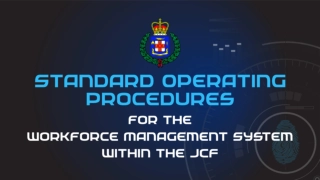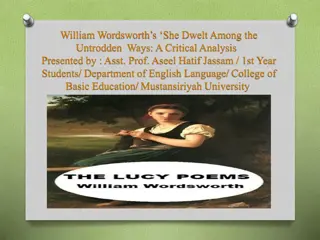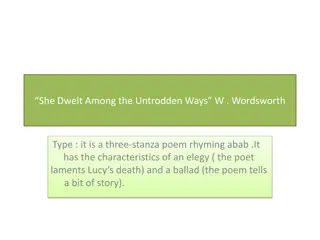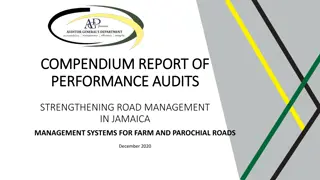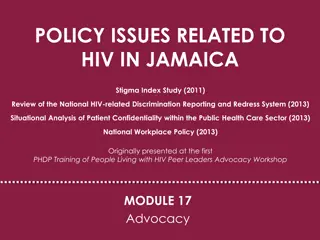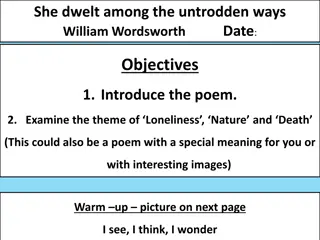Themes and Influences in Jamaica Kincaid's Lucy
Explore the key themes in Jamaica Kincaid's novel Lucy, including identity, colonialism, and rebellion against societal expectations. Reflect on how Kincaid's writing style challenges stereotypes and embraces personal freedom, as discussed by critics like Henry Louis Gates Jr. Connect themes of motherhood and gender identity from Nancy Chodorow's model to Lucy's complex relationship with her mother. Delve into the protagonist's journey of self-discovery within the context of post-colonial influences. Consider the literary connections to works like Jane Eyre as Kincaid reimagines the struggle for autonomy and individuality.
Download Presentation

Please find below an Image/Link to download the presentation.
The content on the website is provided AS IS for your information and personal use only. It may not be sold, licensed, or shared on other websites without obtaining consent from the author.If you encounter any issues during the download, it is possible that the publisher has removed the file from their server.
You are allowed to download the files provided on this website for personal or commercial use, subject to the condition that they are used lawfully. All files are the property of their respective owners.
The content on the website is provided AS IS for your information and personal use only. It may not be sold, licensed, or shared on other websites without obtaining consent from the author.
E N D
Presentation Transcript
Jamaica Kincaid Lucy
Opening Reflections What would you say are the key themes of the text?
Henry Louis Gates Jr. Henry Louis Gates Jr. has stated that [Kincaid] never feels the necessity of claiming the existence of a black world or a female sensibility. She assumes them both. I think it s a distinct departure that she s making, and I think that more and more black American writers will assume their world the way that she does. So that we can get beyond the large theme of racism and get to the deeper themes of racism and get to the deeper themes of how black people love and cry and live and die. Which after all, is what art is all about. In response to this Kincaid explains In actual life white is powerful and black is powerless. I never say people are white. I never say people are black. I describe them. [ ] When I sit at my typewriter, I m not a woman, I m not from the Caribbean, I m not black. I m just this sort of unhappy person struggling to make something, struggling to be free. Yet the freedom isn t a political one or a public one: it s a personal one. Might this suggest that Kincaid is consciously attempting not to claim the stereotype of a black female Caribbean writer?
Lucy/Lucifer Kincaid contends a key to Lucy is the name Lucifer [ ] The great influences on this young woman s life are Genesis and Revelation and, strangely enough, Jane Eyre. [ ] Lucy is a very moralistic person and she s very judgmental. Her view on the world is very much shaped by a nineteenth-century view, filtered through the mist of colony and mother country. Can you see any connections to Jane Eyre? Is Kincaid suggesting it is better reign in Hell, than serve in Heaven , to feel self-possessed than to be a victim?
Reproduction of Mothering Nancy Chodorow in Reproduction of Mothering 1978, documented the pattern of absolute dependence in a primary relationship that links the child to the nurturing mother who plays a role in the formation of gendered identity. Chodorow contends mothering is geared to producing female children who fit into the domestic world and male children to the public world (174). In Chodorow s argument, growing up into womanhood means coming to terms with ideology, meanings and expectations that go into being a gendered member of our society (98). Girls are expected to be continuous and more like their mothers than boys, and they are not supposed to individuate themselves as distinct from their mothers (166). Apply Nancy Chodorow s model to Kincaid s Lucy and her mother, how does this relationship with her mother affect her identity formation? Is the separation from her mother a metaphor for the protagonist s de-colonisation?
Paul Gauguin (1848-1903) French post-Impressionist painter
Reversal of Roles To what extent is Lucy s self invention dependent on the reversal of colonial and patriarchal gender roles? Is Lucy s empowerment, her new sense of strength and cohesion, purchased at too high an emotional cost? How does the protagonist regard sex?




